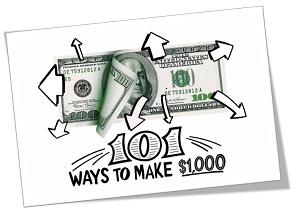What Is God’s Will Regarding Personal Finance? – Debt
What Is God’s Will Regarding Personal Finance? – Debt
Introduction⤒🔗
One of the great pitfalls of our days is the ease with which we are able to satisfy our innate covetousness. Daily we can find in our mailboxes the "generous" offers of credit card companies luring us to obtain "instant and easy credit of thousands of dollars" to satisfy the worldly principle of "have whatever you want whenever you want it."1
 As a result multitudes are trapped in financial debt. Many marriages are ruined or under constant strain because of high debt servicing costs which have resulted from poor management or neglect of responsible budgeting. As quoted earlier, one author estimates that 60-70% of the problems in Christian homes revolve around finances and debts.
As a result multitudes are trapped in financial debt. Many marriages are ruined or under constant strain because of high debt servicing costs which have resulted from poor management or neglect of responsible budgeting. As quoted earlier, one author estimates that 60-70% of the problems in Christian homes revolve around finances and debts.
One author defined financial maturity as follows, "Financial maturity is giving up today's desires for future benefits." This financial maturity is what our generation badly lacks. In this article we would like to focus on the issue of debt. Obviously, in an article such as this we can make only some "marginal notes" and in no way pretend to be exhaustive in the treatment of this vast subject. There are several contemporary authors which have written more extensively on this subject in a biblical way. We recommend that you obtain some of their material (see footnote) and glean from it what is useful and applicable to your needs.2
Changing Times and Definitions←⤒🔗
If we would be able to ask our grandparents what it meant to them for "someone to be able to afford something," their answer would markedly differ from that of our generation. Formerly, being able to afford something meant that you had the cash on hand to pay for it. Today, however, the ability to afford something is whether you can make the monthly payments!
This slow change in the way we view debt is one of the major deceptions of our times. If we are to believe the advertisements and the financial counsel given by salesmen, then it appears that borrowing money to pay for cars, furniture, vacations, and a host of other consumable items is a wise and logical thing to do. If indeed you have adopted the definition of "I can afford it when I'm able to make the monthly payment," it will be mighty hard to resist the advertisement that offers "easy" or "delayed" payments like No Interest for 90 Days!
Formerly a salesperson might have lowered your price if you paid cash. Today the price may go up, because the dealership doesn't get to earn interest from lending you the money. Credit card companies are considering the option of "punishing" those people who faithfully pay off their monthly balance, by eliminating the annual fee for those who pay only the minimal payment each month. We are all familiar with the earning of "free air-miles" for each dollar spent on a Visa or Master Card. Our society wants to lure as many people as possible into borrowing money in order to spend it. The money business even wants you to believe that in order to build up "a good credit rating," you should have some borrowing history!
The Dangers of Debt←⤒🔗
Debt is a deceptive trap. As one author stated, "Getting into debt is as easy as going down an ice-covered mountain. Getting out of debt, however, is just as difficult (or next to impossible!) as climbing that same mountain." The reason that, in general, consumer debt is so deceptive has to do with the fact that "borrowing money always costs far more than at first realized." This realization comes when the borrowed money must be paid back (with interest), which at once limits the opportunities to buy other needed things or exceeds the availability of resources to repay and fulfil our obligations. This, in turn, may make it necessary to borrow more money to pay the instalments on a former loan.
Another danger of debt is that it creates bondage. Solomon wrote in Proverbs 22:7, "The rich ruleth over the poor, and the borrower is servant to the lender." Anyone who has borrowed beyond his ability to repay knows what this text implies. Multitudes of people feel trapped in this financial bondage when they can't pay their bills because of ill-spending. Some spend twenty years to repay their incurred debts. In these twenty years they are able to give away little, or save little for future needs, since the creditor gobbles up all the extra.
At the present almost twenty percent of the disposable income of most American families goes toward the retirement of consumer debts, of which instalment debt is the largest portion. We need to begin teaching our children the value of saving money early. Good financial management from early childhood is a biblical responsibility to teach as well.
Debt as a Symptom←⤒🔗
Larry Burkett, a finance counsellor, stated that the trouble with debt is always and only a symptom of something else. In other words, debt is never the real problem. Debt is often a symptom of an underlying problem such as greed, indulgence, impatience, lack of self-discipline, lack of contentment, search for self-worth, or lack of a proper savings program.
 Perhaps we are quick to object that it is nearly impossible for anyone to avoid debts in this day and age. Why is that so? This is mainly so because we simply are not content to live within the limits of the resources which God has given us. Our teenagers have grown up to expect that once they turn 16 or 17, they have to own a car. Many young couples expect to begin their life together at the material level which their parents have reached after 20-30 years. Others feel they need to keep up with their neighbors or friends. Where are the couples or individuals who patiently save for several years in order to buy what is needed? Often buying is done on impulse when you carry your "handy" credit card with you.
Perhaps we are quick to object that it is nearly impossible for anyone to avoid debts in this day and age. Why is that so? This is mainly so because we simply are not content to live within the limits of the resources which God has given us. Our teenagers have grown up to expect that once they turn 16 or 17, they have to own a car. Many young couples expect to begin their life together at the material level which their parents have reached after 20-30 years. Others feel they need to keep up with their neighbors or friends. Where are the couples or individuals who patiently save for several years in order to buy what is needed? Often buying is done on impulse when you carry your "handy" credit card with you.
How important it is to check our motives against this list each time we are about to borrow (more) money! Justus Vermeer in his Catechism sermons repeatedly warns against the sin of people living beyond their "level." How little do we see this as a sin! It is almost normal for any of us to take out a loan to finance a car, new furniture, a vacation, or even to buy gifts for others! It is definitely wrong to live beyond your means; however, if finances are organized properly and if one has stable employment, loans or mortgages may be a legitimate necessity. It is wiser to pay mortgage payments than to pay excessive rent.
Criteria for Borrowing←⤒🔗
Nowhere does the Bible say that it is a sin to borrow, although God's Word does give many warnings about being in debt. The text, "Owe no man anything, but to love one another" (Romans 13:8), deals not with money issues but with relationships. Nowhere does the Scripture tell us it is wise or advisable to borrow to accomplish God-given economic goals.
What does the Bible say about borrowing? One of the clearest directions is found in Psalm 37:21, "The wicked borroweth, and payeth not again." The teaching of this verse is plain. If you borrow, you have to repay. Not repaying your loans is called wicked. If you don't have a guaranteed way of repayment, you should at all cost avoid going into debt.3 Many of us presume much upon the future: the continuation of a job, good health, that the asset borrowed against will continue to go up in value, or that our business will continue to generate a profit. God admonishes not to assume such things: "Go to now, ye that say, Today or tomorrow we will go into such a city and continue there a year, and buy and sell and get gain: whereas ye know not what shall be on the morrow. For what is your life? It is even a vapour, that appeareth for a little time, and then vanisheth away" (James 4:13-14).
Are there any situations or circumstances under which one may borrow money? Yes, there are circumstances when one needs to borrow without knowing the future. There are reasons or emergency circumstances which may override the "foolishness" of borrowing money to finance a depreciating item. A truck driver may need to take out a loan to finance the vehicle which he needs for his work. Likewise a couple may need to borrow money to finance a van needed to transport their handicapped child or to provide in times of illness of the breadwinner. Borrowing money to finance the purchase of a first house is almost unavoidable for everyone. However, housing costs should not exceed one third of the family income.
Never, however, are we to go into debt to finance a consumptive lifestyle. In order to avoid the use of debt, the preparation of a financial plan (budget) is an excellent tool.4 Itemizing your "normal" and expected expenses may give you a better insight into what your limits are. Obviously, we need to seek grace to stay within these limits.
Credit Cards←⤒🔗
Many (if not most) of us use the "easy and convenient" credit card. The use of the credit card is not wrong when one knows there is money in the bank to pay once the bill comes home. Other people use their credit card simply as a "check" and faithfully pay off their bills each month.  The convenience of the credit card is appealing to all of us: it enables us to travel without a great deal of cash, it minimizes the trauma of robberies, it makes record keeping easier, and it allows people to spend ''more comfortably."
The convenience of the credit card is appealing to all of us: it enables us to travel without a great deal of cash, it minimizes the trauma of robberies, it makes record keeping easier, and it allows people to spend ''more comfortably."
However, the dangers of the credit card are many, especially for our materialistic generation. Credit cards supply large amounts of money at once, which for many is too great a temptation. It gives the opportunity for instant gratification and for buying on impulse. Moreover, anyone can obtain several credit cards at the same time.5 It is a statistical fact that one of every six people who are using credit cards is burdened with excessive debt, i.e., with payments exceeding his resources. It is also a fact, which credit card companies know best themselves, that, generally speaking, putting a credit card into one's hands will result in an average of a 34% increase in spending!
Also in this context, having a definite spending plan will exert a controlling influence upon one's spending. To use credit cards to fund living expenses is to invite temptation into spending decisions.
Conclusion←⤒🔗
Many questions must remain unanswered in these articles. We hope it has stimulated us to be more conscious about the use of the resources God has given us, as well as what our attitude ought to be toward the resources God has not given us!
In the remaining article on this subject we will try to answer a few more specific questions regarding finances.

Add new comment